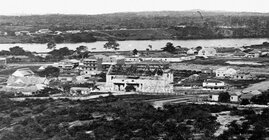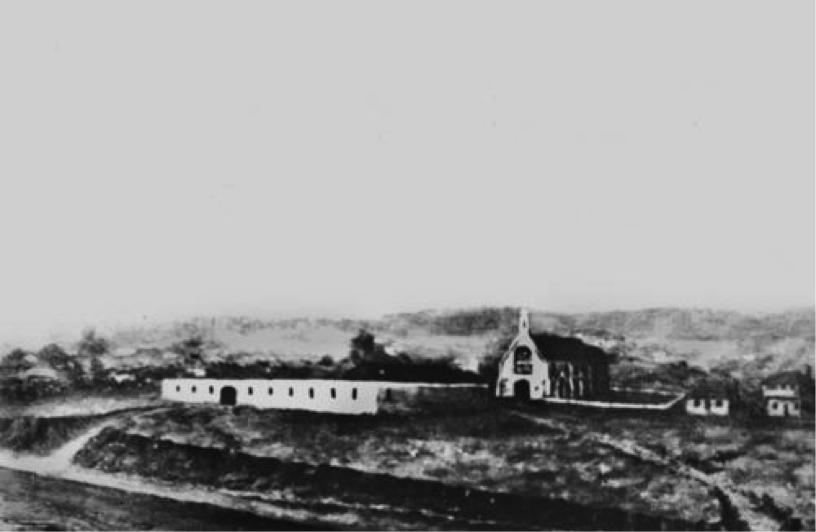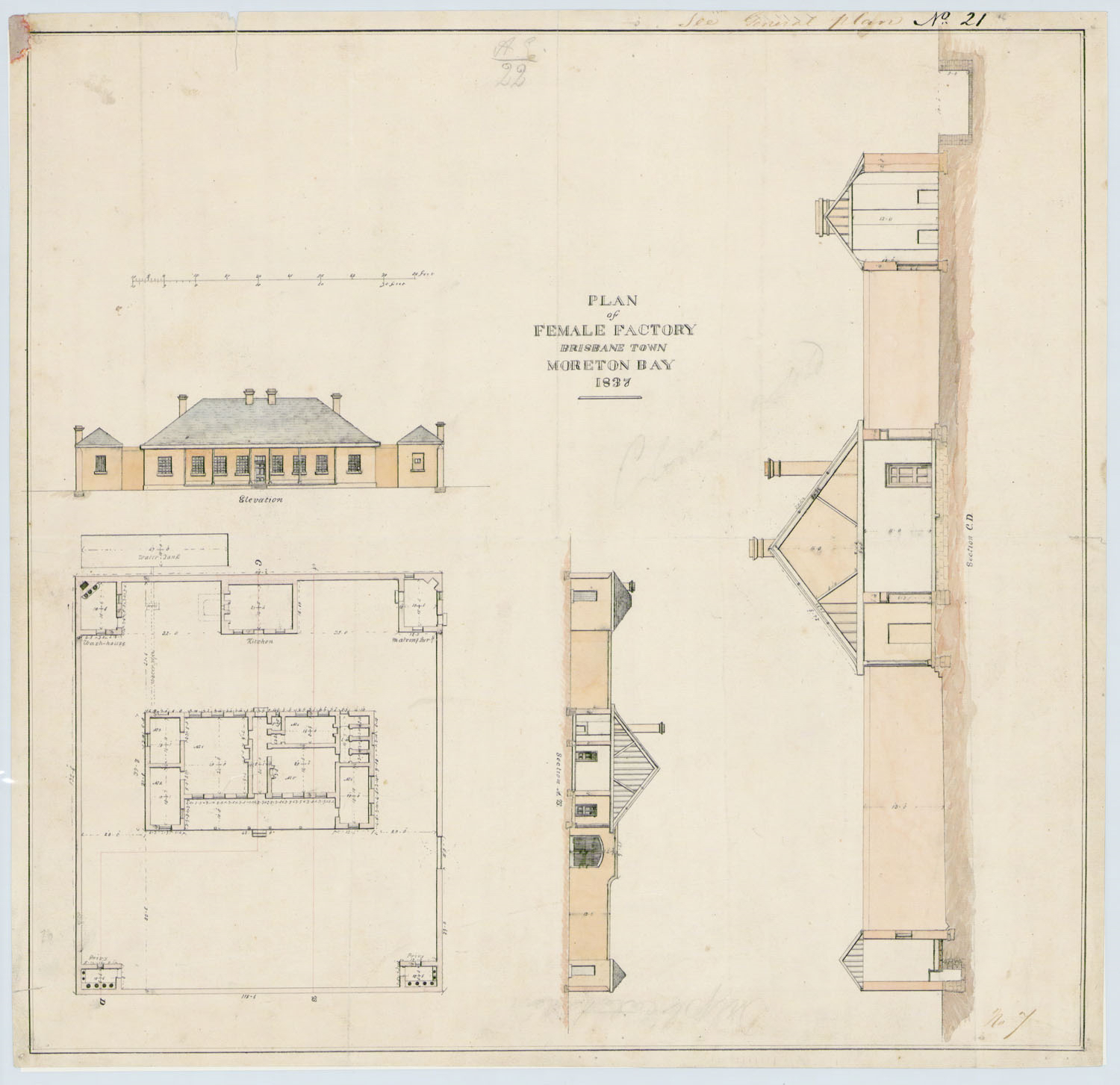Honora Bagnall née Geary (1809 – 1868), a flax spinner and convict, was born in Connough, Galway, Ireland. Under a sentence of seven years transportation to New South Wales for stealing, she arrived in Sydney on 27 September 1831 on board the Hooghly. She married William Bagnall on 11 May 1835 and on 19 October 1835 she was sentenced to 5 years’ transportation to Moreton Bay for stealing. When the penal settlement closed, Honora returned to Sydney on the Sophia Jane, arriving 22 May 1839. Honora died on 10 June 1868 at Campbells River, NSW.
Honora Bagnall was born c.1809 in Ireland to Edward and Catherine Geary. She worked for three years as a flax spinner at Ballynahinch Castle in Connemara and is then thought to have married Edwin Goodwin, a soldier in the 64th Regiment of Foot. There is no extant documentation to confirm the marriage.
Honora returned to County Galway after giving birth to a daughter, Helen, in Boleybeg in the civil parish of Rahoon. Receiving no support from family and friends, in desperation Honora stole three pigs which she hoped to sell to raise enough money to feed her baby. She was charged and convicted in July 1830 in the General Quarter Sessions in Galway and sentenced to seven years’ transportation. A petition was written on her behalf begging for mercy due to her circumstances, and the fact that it was her first offence, but it was dismissed and Honora and her baby left Cork on the Hooghly on 24 June 1831 bound for Australia.
The master of the Hooghly was Peter John Reeves and the surgeon was James Ellis. There were 186 women prisoners, 10 free settlers and 20 children on board, although two of the women were returned to shore before the ship sailed. After a 95-day voyage marred by severe weather and sickness, the ship arrived in Sydney on 27 September 1831 and those on board were able to disembark on 5 October 1831. A total of 71 women, including Honora, were sent straight to the Parramatta Female Factory.
On 13 January, 1833, Father John McEnroe, who was later appointed chaplain at the notorious Norfolk Island penal settlement, granted Honora permission to marry James Winstanley, who had arrived per Malabar in 1819 with a sentence of 14 years. The marriage did not eventuate and James married Priscilla Woodford around June that same year.
Two years later, Honora married William Bagnall on 11 May 1835 at St John’s Church of England, Parramatta. The minister was Reverend Samuel Marsden who was a stern man and, as a magistrate, reputed to approve severe punishments. Honora’s second daughter Ann had been born the previous year, but her birth was apparently not registered. William had been transported on the Albion for highway robbery in 1827, after his original sentence of death was commuted to fourteen years.
Honora was assigned to her husband William Bagnall when she stood trial for ‘feloniously stealing taking or carrying away on the 28th day of September 1835 at Sydney, Colony of NSW, one piece of print of the value 20 shillings the goods and chattels of Elias Ellis’. In her defence Honora stated that she had bought the material at auction, but this was rejected by the Court. Her sentence of five years’ transportation was handed down at the Sydney Quarter Sessions on 19 October 1835 and was to be served at the Moreton Bay penal settlement.
At the time of her sentencing, Honora was thought to be too heavily pregnant to travel and was returned to the Female Factory on 15 December, 1835. William Michael Bagnall was born towards the end of January 1836 and was christened in St Mary’s Catholic Church on 11 March 1836 by Father John McEnroe. A letter written on Honora’s behalf by the Sheriff to the Colonial Secretary on 27 February 1836 stated that she was ‘under sentence 5 years to a Penal Settlement…. Praying that her eldest child a Girl, 5 years of age may be admitted into the Orphan School and that she may be allowed to bring her other 2 children with her to a Penal Settlement, whose ages are–1-1 ½ years the other–1 month’. This request was granted and William and Ann accompanied her to Moreton Bay on board the Dart, which arrived on 20 June 1836. Honora’s older daughter Helen (also referred to as Ellen) was sent to the Parramatta Female Orphanage on 11 June 1836. Helen remained in the Female Orphan School until 29 May 1841. The Matron of the Orphan School wrote to the Colonial Secretary’s Office on 20 March 1841 stating that she had no objection to Ellen Bagnell [sic] becoming apprenticed to Mr William Baker of Sydney as a house servant.
Honora began the return journey from the Moreton Bay with her other two children on 9 May 1839 after it was decided to close the penal settlement to make way for settlers. Her sentence was not shortened and she was returned to Darlinghurst Gaol on 22 May 1839. William had a ticket of leave for the Parramatta district granted on 1 December 1833 and was successful in having this altered from Parramatta to the Patricks Plains district on 18 November 1837. This was after Honora had been transported to Moreton Bay. The family was reunited when Helen returned to her father’s care in August 1842.
The date of Honora’s release from Darlinghurst Gaol is not known but is thought to be towards the end of 1839. At the time her daughter Sarah, also known as Mary Ann, was born in Maitland on 7 July 1840, William was working as a blacksmith. The couple’s second son, Samuel, was born in Maitland the following year on 24 October 1841 and was christened in West Maitland on 28 October 1841. Sadly the baby was not strong and died on 29 October 1841 and was buried in the Glebe cemetery in Maitland.
The Female Factory provided a report on 19 December 1842 and Honora was granted a Certificate of Freedom on 17 February 1843. On 8 September 1843 she was sentenced to three months in Sydney Gaol for attempting to pass a brass token as a guinea and was dealt with under the Vagrant Act.
By 1854 the family had moved to the Bathurst area, where William died on 7 August 1854. Honora was left to manage on her own and she became a victim of theft herself in later years when she had horses stolen. The New South Wales Police Gazette reported on 12 April 1860: ‘Stolen in the month of March last, the property of Honora Bagnell of Campbells River – a dark bay mare, branded Wll over rear shoulder, blaze in face in shape of T on top; a black horse branded Wll near shoulder; and two dark bay fillies, unbranded. Supposed to have gone in the direction of Port Phillip. 5 pound reward offered upon conviction of the offenders and recovery of the horses’.
Honora died in Bathurst of stricture of the oesophagus on 10 June 1858 and was buried at Bathurst Cemetery. She was survived by her children William, Helen, Ann and Sarah.
Author: Rosemary Foran, descendent of Honora Bagnall.
Additional sources: Jan Richardson, Harry Gentle Resource Centre.
Citation
Rosemary Foran, ‘Honora Bagnall (née Geary) (1809 – 1868)’, Harry Gentle Resource Centre, Griffith University, 2021 (updated 2023), https://harrygentle.griffith.edu.au/life-stories/honora-bagnall-nee-geary/.
Archival Resources
NSW State Archives, Register of convicts’ applications to marry, NRS 12212, Item 4/4058, Fiche 780
NSW Registry of Births, Deaths and Marriages, Reg. No. 3006/1868
NSW State Archives, Butts of Certificates of Freedom, NRS 12210, Item 4/4319, Reel 992
NSW State Archives, Register of convicts’ applications to marry, NRS 12212, Item 4/4509, p. 21
Books
Jennifer Harrison, Shackled: Female Convicts at Moreton Bay 1826-1839.
Melbourne: Anchor Books, 2016.
Newspapers
Law Intelligence - Sydney Quarter Sessions, Sydney Herald, 22 Oct 1835, p. 3.
"Police Court business", Sydney Morning Herald, 8 Sep 1843, p. 3.
Online Resources
Convict Records of Australia: Honor Geary per Hooghly (1831)





